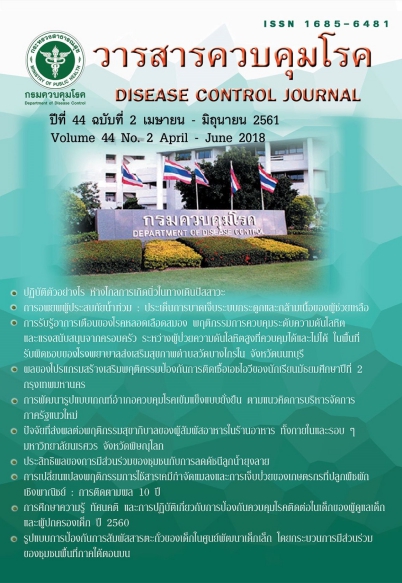How to behave far away the urinary calculi
DOI:
https://doi.org/10.14456/dcj.2018.11Keywords:
prevention, urinary calculiAbstract
Generally, urinary calculi can be prevented. The main risk factors of urinary calculi are genetic factors and environmental factors. Food and water are important environmental factors contributing to urinary calculi. General protection measures is to eat a variety of fully five among each group. You should not eat anything for a long time. You should drink 2-3 liters of water a day. You should exercise regularly. You should sleep well enough. You should avoid stress. You should not be in the hot weather. Specific protection measures in postoperative patients with urinary tract diseases that found any type of stones can be prevented by limiting certain foods that cause those calculi. These patients should not abstain from eating calcium-containing food. You should receive calcium 800 mg. per day. In public health aspects, providing knowledge and suggestions urinary calculi. The cost of surgery or endoscopic surgery is so high accompanying with expensive patients’ and government’s expenditures in cases of non-treatment, and finally it can cause chronic renal failure and death.
Downloads
References
2. Eisenberger F, Miller K, Rassweiler J. Extracorporeal shock wave lithotripsy (ESWL). In: Eisenberger F, Miller K, Rassweiler J, editors. Stone therapy in urology. Stuttgart: Georg Thieme Verlag; 1991. p. 29-82.
3. มณทิรา มฤคทัต. นิ่วในทางเดินปัสสาวะ. สงขลา: โอ เอส พริ้นติ้งเฮ้าส์; 2545.
4. Borghi L, Meschi T, Schianchi T, Brigggganti A, Guerra A, Allegri F, et al. Urine volume: stone risk factor and preventive measure. Nephron 1999;81 suppl 1:31-7.
5. Bellizzi V, DeNicola L, Minutolo R, Russo D, Cianciaruso B, Andreucci M, et al. Effects of water hardness on urinary risk factors for kidney stones in patients with idiopathic nephrolithiasis. Nephron 1999;81 suppl 1:66-70.
6. Teotia M, Teotia SPS, Singh DP, Nath M. Chemical composition of drinking water and the incidence of stone. Urol Res 1990;18 suppl 1:A.95.
7. Sriboonlue P, Prasongwatana V, Chata K, Tungsanga K. Prevalence of upper urinary tract stone disease in a rural community of North-Eastern Thailand. Br J Urol 1992;69:240-4.
8. Schneider HJ. Epidemiology of urolithiasis. In: Schneider HJ, editor. Urolithiasis: Etiology and diagnosis. Berlin: Spronger-Verlag; 1985. p. 138-84.
9. ไพฑูรย์ คชเสนี, วีระ วิเศษสินธุ์, สมบุญ เหลืองวัฒนากิจ. นิ่วในทางเดินปัสสาวะ. ใน: ไพฑูรย์ คชเสนี, กฤษฎา รัตนโอฬาร, บรรณาธิการ. ศัลยศาสตร์ระบบทางเดินปัสสาวะและอวัยวะสืบพันธุ์ชาย. กรุงเทพมหานคร: สยามสเตชันเนอรีซัพพลายส์; 2537. หน้า 289.
10. Menon M, Parulkar BG, Dranch GW. Urinary lithiasis. In: Walsh PC, Retik AB, Vaughan JrED, Wein AJ, editors. Campbell’s Urology. 7th ed. Philadelphia: W.B. Saunders; 1998. p. 2665-6.
11. บรรณกิจ โลจนาภิวัฒน์. ตำรานิ่วในระบบทางเดินปัสสาวะการเกิดโรค การวินิจฉัยและการรักษา. กรุงเทพมหานคร: บียอนด์ เอ็นเทอร์ไพรซ์; 2548.
12. Hesse A, Joost J. Die verschiedenen Harnsteinarten. In: Hesse A, Joost J, editors. Ratgeber für Harnsteinpatienten. Tuebingen: TRIAS-Thieme Hippokrates Enke; 1992. p. 62-107.
13. ดำรงพันธุ์ วัฒนะโชติ. นิ่ว วิธีการรักษาและป้องกัน. หมอชาวบ้าน 2531;10:22-30.
14. Jackson RD, LaCroix AZ, Gass M, Wallace RB, Robbins J, Lewis CE, et al. Calcium plus vitamin D supplementation and the risk of fractures. N Engl J Med 2006;354:669-83.
15. Domrongkitchaiporn S, Sopassathit W, Stitchantrakul W, Prapaipanich S, Ingsathit A, Rajatanavin R. Schedule of taking calcium supplement and the risk of nephrolithiasis. Kidney Int 2004;65:1835-41.
16. Curhan GC, Willett WC, Speizer FE, Spieyelman D, Stampfer MJ. Comparison of dietary calcium with supplemental calcium and other nutrients as factors affecting the risk of kidney stones in women. Ann Intern Med 1997;126:497-504.
17. Committee to Review Dietary Reference Intakes for Vitamin D and calcium, Food and Nutrition Board, Institute of Medicine. Dietary reference intakes for calcium and vitamin D. Washington D.C.: The National Academy Press; 2010.
18. Borghi L, Schianchi T, Meschi T, Guerra A, Allegri F, Maggiore U, et al. Comparison of two diets for the prevention of recurrent stones in idiopathic hypercalciuria. N Engl J Med 2002;346:77-84.
19. Mathew D. Calcium intake and urinary stone disease. TAU 2014;3:235-40.
20. สุรเกียรติ อาชานานุภาพ. นิ่วท่อไต [อินเทอร์เน็ต]. 2551 [สืบค้นเมื่อ 11 ต.ค. 2560]. แหล่งข้อมูล: http://www.doctor.or.th/article/detail/5778
21. กรุงเทพธุรกิจ. นิ่วในไต จะน่ากลัวหรือไม่ ควรรู้ไว้ [อินเทอร์เน็ต]. 2551 [สืบค้นเมื่อ 11 ต.ค. 2560]. แหล่งข้อมูล: http://hilight.kapook.com/view/30826
22. โรงพยาบาลเปาโล. นิ่วในระบบปัสสาวะ [อินเทอร์เน็ต]. 2560 [สืบค้นเมื่อ 11 ต.ค. 2560]. แหล่งข้อมูล: http://www.paolohospital.com/phahol/healthurology/urinary-stones
23. NHS choices. Kidney stones: prevention [Internet]. 2016 [cited 2016 Oct 9]. Available from: https://www.nhs.uk/Conditions/Kidney-stones/Pages/Prevention.aspx
24. Henderson R. Urinary tract stones [Internet]. 2015 [cited 2016 Oct 9]. Available from: https://patient.info/doctor/urinary-tract-stones-urolithiasis
Downloads
Published
How to Cite
Issue
Section
License
Articles published in the Disease Control Journal are considered as academic work, research or analysis of the personal opinion of the authors, not the opinion of the Thailand Department of Disease Control or editorial team. The authors must be responsible for their articles.






